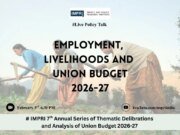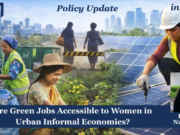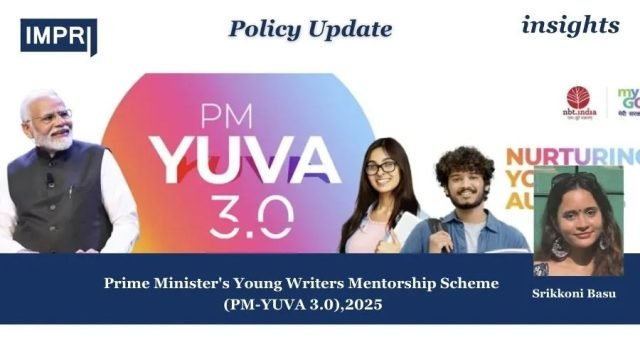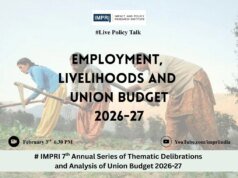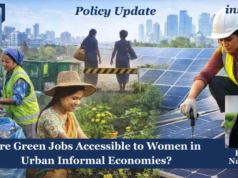Policy Update
Srikkoni Bas
Introduction
The PM YUVA was initially launched on May 31, 2021. Topics like Unsung Heroes, Contributions to Independence, and other unheard of cultural narratives inspired young writers to get involved and join hands with creativity. The previous schemes saw the participation of 22 Indian languages and English, promoting India’s heritage and cultural diversity.
The Ministry of Education and the National Book Trust of India have launched the Pradhan Mantri Yuva Udyamita Vikas Abhiyan, known as YUVA 3.0, on March 11, 2025. This scheme is launched to build and train young authors (below 30 years of age) to promote reading, writing, and enhance book culture. PM YUVA 3.0 is launched to provide exposure to the young minds, which improves their creative and literary skills.
The third edition of this initiative is a follow-up to the remarkable success of the PM YUVA 1.0 and 2.0 (PIB,2025). The First scheme was launched following the “Azaadi ka Amrit Mohotsav” initiative. Building on the predecessor scheme, PM YUVA 3.0 continues to support India’s upcoming literacy talent. It provides a crucial opportunity for young members to become cultural ambassadors on a national and international level.
Vision and Purpose
The Prime Minister’s Young Writers Mentorship Scheme (PM-YUVA 3.0) is not just a literary training program. It is a nationwide mission to develop a generation of writers who can write sensibly and forcefully and narrate India’s tale to the world authentically and richly.
Fundamentally, the scheme reflects the dream of creating a confident, culturally grounded, and intellectually empowered youth society. India, 66% of whose population is below the age of 35, boasts a demographic dividend like no other country, but that potential requires the proper vehicle to convert youthful energy into productive national inputs. Literature, which can keep history alive, stimulate thinking, and generate imagination, is one such vehicle. PM-YUVA 3.0 plans to be that vehicle between youthful imagination and national narrative.
- Encouraging a Culture of Writing and Reading
In the last few years, rapid transformation in technology has influenced reading culture and cultural participation. The program aims to turn the trend of diminishing deep reading by actively encouraging a culture of books. It not only makes young people read but also educates them to write excellent, research-oriented, and creatively insightful pieces of work. The concept is to give a new lease of life to literature as a strong tool of expression in the era of content pieces and short attention spans.
- Instilling Cultural Pride and International Projection
One of the key intentions of PM-YUVA 3.0 is to help young writers comprehend and relish India’s great cultural heritage, yet present it in such a way that it has appeal worldwide. The topics that are included are as follows: Projection of India’s knowledge system, like ancient science and philosophy, to innovations
- Emphasizing the Indian diaspora’s efforts in constructing bridges between India and the world.
- Recording contemporary nation-builders whose efforts have influenced the nation after independence.
It is through such themes that the scheme uses literature not just as an exercise in self-expression but as a form of cultural diplomacy.
- Contribution of the Indian Diaspora in Building the Nation
It’s not just that the diaspora is so many Indians located outside of the country; it is a representation of India’s cultural legacy and intellectual heritage worldwide. Younger writers will see how the diaspora has enriched India, both its economy and its external relations, its soft power. It also helps chronicle peaceful acculturation and cultural transfer around the world.
- Indian Knowledge System (IKS)
This theme is also a direct response to the growing need for old and new to find coexistence. It invites contributions on Ayurveda, astronomy, linguistics, architecture, ‘vidyasthana’, and philosophies, as well as their continued implications for problem-solving in the present context.
Alignment with NEP 2020
PM YUVA 3.0 scheme aligns with the new educational policy. National Education Policy 2020 focuses on empowering young minds and preparing them for leadership roles in a complex and interconnected world.
PM-YUVA 3.0 serves the purpose directly by building research capabilities among young students, fostering their minds and improving critical thinking, and developing leadership through the involvement of more cultural expressions.
Mentorship here is not just about writing skills, as it encompasses training in critical thinking, fact-based storytelling, and recognizing audience viewpoints, all of which are critical skills for future leaders. According to the scheme, the young authors will serve as cultural figures, bringing India’s stories to a global audience while also fostering national unity. In this sense, PM-YUVA 3.0 is a component of the larger Ek Bharat Shreshtha Bharat vision, which uses literature for both international outreach and national integration.
Influence on Literature and Society
The effects of PM-YUVA 3.0 reach beyond individual authors. It is vital to revive the culture of reading and writing books at a time when digital platforms and short content dominate attention spans. By supporting young authors, the program helps preserve India’s history, culture, and knowledge for future generations. It offers a platform for diverse voices from various communities, languages, and regions, which also expands the range of literature. Fresh perspectives can breathe new life into Indian literature, benefiting the publishing industry as well. The program promotes cultural understanding by sharing India’s story of diversity, adaptability, and creativity with audiences worldwide.
Challenges Ahead
PM-YUVA 3.0, despite good structure, may face certain headwinds. The biggest challenge is the declining reading culture, especially among young people. They are also attracted to instant content on social media. Another of its challenges is seeing to the equitable treatment of rural voices, marginalized communities, and regional languages alongside mainstream narratives. Sustainability of foundations for the career of young writers beyond the mentorship should also be specifically addressed. Without long-term prospects such as follow-up publishing contracts, grants, or a creative writing fellowship, many writers might struggle to sustain their writing trajectory.
Way Forward
To overcome these challenges, the programme needs to broaden its engagement with schools, colleges, and universities. It ought to serve as an inducement to students to engage in creative writing at a tender age. Adding a digital approach to book culture will enable us to reach out to even more people and to get tech-savvy young people interested in reading.
There is also a call for sustained support systems in addition to mentorship fellowships, residencies, and publishing partnerships where selected authors can establish solid careers. The programme might also provide opportunities for international partnerships, offering Indian writers an opportunity to reach out to the English-speaking world of letters. These will establish PM-YUVA as a watershed in the cultural and literary scene of India.
Conclusion
At bottom, PM-YUVA 3.0 is not a mere scheme; indeed, it is a cultural investment in India’s youth. It fosters an environment that allows young minds to bloom, to add their creativity to the nation’s culture, to project themselves, as evolving India, on a global platform. Mentoring the new authors, publishing and providing them with national and international platforms, their efforts have Indian stories narrated with authenticity and pride. In the end, PM-YUVA 3.0 enables the realization of the vision of Ek Bharat Shreshtha Bharat, in which literature becomes a bridge between past and future, local and global, between youth creativity and national development.
References
- Government of India. (2025, February 10). Prime Minister’s young authors mentorship scheme (PM-YUVA 3.0). India.gov.in. https://www.india.gov.in/spotlight/prime-ministers-young-authors-mentorship-scheme-yuva-30-scheme
- Ministry of Education. (2025, February 9). PM-YUVA 3.0: Ministry of Education launches scheme to mentor young authors. Press Information Bureau. https://pib.gov.in/PressReleasePage.aspx?PRID=2112207
- MyGov. (2025, March 11). PM-YUVA 2025 – Mentorship scheme for young authors. Innovate India. https://innovateindia.mygov.in/yuva-2025
- National Book Trust. (2025, February 15). Promotional outreach for PM-YUVA 3.0 mentorship scheme in universities and colleges. NBT India. https://www.nbtindia.gov.in/news__10118__promotional-outreach-for-pm-yuva-3-0-mentorship-scheme-in-universities-and-colleges.nbt
- India Today. (2025, February 10). PM-YUVA 3.0: Ministry of Education launches scheme to mentor young authors. Best Colleges. https://bestcolleges.indiatoday.in/news-detail/pm-yuva-30-ministry-of-education-launches-scheme-to-mentor-young-authors-check-details-here
- Free Press Journal. (2025, February 10). Ministry of Education announces PM-YUVA 3.0 scheme for mentoring young authors: Details here. https://www.freepressjournal.in/education/ministry-of-education-announces-pm-yuva-30-scheme-for-mentoring-young-authors-details-here
About the Author
Srikkoni Basu is currently a postgraduate student at Dr. B.R. Ambedkar University, Delhi. She is working with IMPRI and has fieldwork experience based on gender, livelihood, and environment with SEVA, Kolkata.
Acknowledgment
The author is grateful to Aasthba Jadeja and Bhaktiba Jadeja for their support and guidance.
Disclaimer: All views expressed in the article belong solely to the author and not necessarily to the organization.


